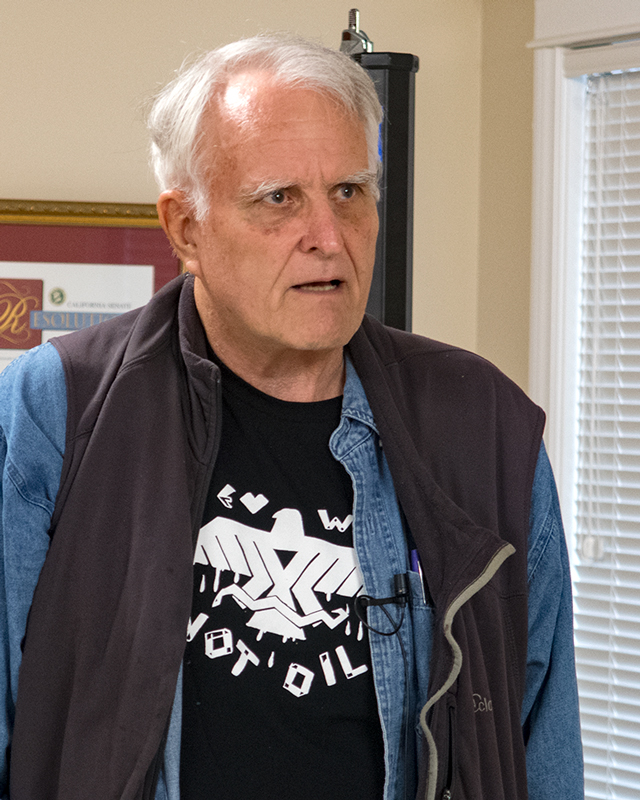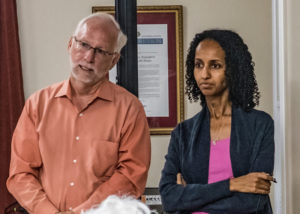Monday, July 31, 2017

Don Bechler, left, of Single Payer Now advocated a single-payer health care system for California. He was followed by Eden Nagash-Powell and Don Stump, both representing Christian Church Homes, the developer proposing to build 150 housing units for low-income seniors at the site of Forest Hill Christian Church and its childcare center, 250 Laguna Honda Boulevard.
Supervisor Norman Yee (District 7) was originally scheduled to address us at this meeting but cancelled. He is rescheduled for October.
Single Payer Health Care
The system Bechler advocated would finance health care costs through state taxes: a 2.3% gross receipts tax on California companies that have more than $1 million in gross receipts, plus a 2.3% increase in the sales tax. Food, utilities, and housing would be excluded from the increase.
California residents would pay no premiums or co-pays, and there would be no deductibles. The system would cover basic costs (including mental health services) for all residents regardless of a person’s income, occupation, or health. The state would pay doctors, clinics, hospitals, and other medical service providers, eliminating health insurance companies. The state would need a federal waiver for Medicare and Medicaid. Bechler said the system would eventually seek to include Tricare (for military families) and other forms of federal employee insurance. If there were no federal waiver, the California Insurance Commissioner would bill federal agencies, taking that burden off customers.
Bechler said the elimination of insurance companies, with their bureaucracies and profits, would reduce costs. Drug costs would fall because the state would be able to negotiate lower prices. However, costs would tend to rise because the state would cover more people, including undocumented immigrants, and would cover mental health services.
A proposal for single payer health care in California advanced in 2017 in the State Senate but failed in the Assembly. Assembly Speaker Anthony Rendon prevented a vote in the Assembly because the bill as written had no funding mechanism. The chief sponsor of the bill was the California Nurses Association.
Proposed Senior Housing at Site of Forest Hill Christian Church
Christian Church Homes, a non-profit organization based in the Bay Area, has developed 30 properties in three states, totaling more than 2390 homes for low-income seniors. The organization manages 59 senior communities in seven states. The projects are designed for adults who can live independently; CCH does not provide assisted living or run nursing homes. It hopes residents can stay in their homes even when the time comes for hospice care.
For the site at 250 Laguna Honda Boulevard, CCH proposes 150 rental apartments for seniors with incomes no higher than either 50% or 60% of the Average Median Income in San Francisco. In 2017, 50% of AMI in San Francisco was $40,350 in annual income for one person, $46,150 for a couple. One-bedroom apartments will be about 600 square feet, which is the state standard for a one-bedroom, and will include a full living room, kitchen, and bathroom. Twenty percent (20%) of the 150 units would be reserved for formerly homeless seniors. They would pay about $250 per month in 2017 dollars.
Portions of the current church and preschool at the site would be preserved in some form, though studies, planning, and negotiations would continue. Mr. Stump and Ms. Nagash-Powell said CCH is working to resolve concerns of the neighbors above the site in Forest Hill and with Supervisor Norman Yee’s office. Among those concerns are the stability of the hill behind the site and below Castenada Avenue. The hill would likely be shored up with a retaining wall. Rainy-season flooding would be addressed. There would be parking at the site, though most residents would not drive (or would stop as they age), and there is adequate mass transit at Forest Hill MUNI Station.
There would be a wide drop-off zone for vehicles. Vans and shuttles would convey the fragile elderly to medical appointments, shopping, etc. There would be a service coordinator and day-to-day staff. The City would provide caseworkers for the formerly homeless.
The project is still in the initial planning and environmental evaluation stages. It could take a year to reach public hearings at City Hall. If the project were approved, it would be another year or two before construction was completed.
